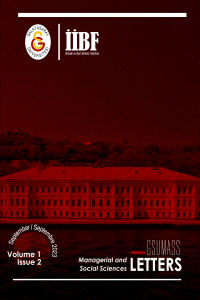THE RATIONALITY OF INFLATION EXPECTATIONS IN TURKEY AND ITS EFFECT ON THE FUNCTIONING OF EXPECTATIONS CHANNEL
Anticipations d’inflation, Politique monétaire macro prudentielle, Mécanisme de transmission., : Inflation expectations, Macroprudential monetary policy, Transmission mechanism.
THE RATIONALITY OF INFLATION EXPECTATIONS IN TURKEY AND ITS EFFECT ON THE FUNCTIONING OF EXPECTATIONS CHANNEL
___
- Abdioğlu, Z., & Yılmaz, S. (2013). Rasyonel Beklentiler Hipotezinin Testi: Enflasyon, Faiz ve Kur. Çukurova Üniversitesi İktisadi ve İdari Bilimler Fakültesi Dergisi, 17(1), 21-36.
- Alcidi, C., Gros, D., & Shamsfakhr, F. (2022). Inflation expectations: models and measures. Politica economica, 1-18. https://doi.org/10.1429/103706
- Andolfatto, D., Hendry, S., & Moran, K. (2008). Are inflation expectations rational?. Journal of Monetary Economics, 55(2), 406-422. https://doi.org/10.1016/j.jmoneco.2007.07.004
- Barlas Özer, Y., & Mutluer, D. (2012). Inflation expectations in Turkey: Statistical evidence from the business tendency survey. Central Bank Review, 5(2), 73-97.
- Başkaya, S., Kara, H., & Mutluer, D. (2008). Expectations, communication and monetary policy in Turkey. TCMB Çalışma Tebliği, 8(1).
- Bernanke, B. S. (2007, July). Inflation expectations and inflation forecasting. In Speech at the Monetary Economics Workshop of the National Bureau of Economic Research Summer Institute, Cambridge, Massachusetts (Vol. 10).
- Blanchard, O. & Cohen, D. (2004). Macroéconomie, Bruxelles: Pearson Education, ISBN 2-7440-7019-X. 593p. Chamouton, T., & Piatecki, C. (1984). Anticipations rationnelles et théorie économique. Revue d’économie politique, 754-772. http://www.jstor.org/stable/24698862.
- Christiano, L., & Gust, C. (2000). The expectations trap hypothesis. National Bureau of Economic Research Working Papers, 7809. https://doi.org/10.3386/w7809
- Englander, A. S., & Stone, G. (1989). Inflation expectations surveys as predictors of inflation and behavior in financial and labor markets. Quarterly Review, 14(Aut), 20-32.
- Figlewski, S., & Wachtel, P. (1981). The formation of inflationary expectations. The Review of Economics and Statistics, 1-10. https://doi.org/10.2307/1924211
- Forsells, M., & Kenny, G. (2002). The rationality of consumers’ inflation expectations: survey-based evidence for the euro area. European Central Bank Working Paper Series, 163. Available at SSRN 358021. https://doi.org/10.2139/ssrn.358021
- Guesnerie, R. (2011). Rationalité économique et anticipations rationnelles. Idées économiques et sociales, 165(3), 7-14. https://doi.org/10.3917/idee.165.0007
- Kara, H., & Tuğer, H. K. (2005). Some evidence on the (ir) rationality of inflation expectations in Turkey. The Central Bank of the Republic of Turkey Working Paper, 05(12).
- Kara, H., & Küçük-Tuğer, H. (2010). Inflation expectations in Turkey: learning to be rational. Applied Economics, 42(21), 2725-2742. https://doi.org/10.1080/00036840801964559
- Karadaş, E., & Öğünç, F. (2003). An Analysis of Inflation Expectations of the Turkish Private Manufacturing Industry. Central Bank Review, 3(2), 57-83.
- Lucas Jr, R. E. (1972). Expectations and the Neutrality of Money. Journal of economic theory, 4(2), 103-124. https://doi.org/10.1016/0022-0531(72)90142-1
- Muth, J. F. (1961). Rational expectations and the theory of price movements. Econometrica: Journal of the Econometric Society, 315-335. https://doi.org/10.2307/1909635
- Oral, E. (2013). Consumer inflation expectations in Turkey (No. 10). Bank for International Settlements. Oral, E., Saygili, H., Saygili, M., & Tuncel, S.Ö. (2011). Inflation expectations in Turkey: evidence from panel data. OECD Journal: Journal of Business Cycle Measurement and Analysis, 2011(1), 5-28. https://doi.org/10.1787/jbcma-2011-5kgg5k53np7c
- Pesaran, M. H., & Weale, M. (2006). Survey expectations. Handbook of economic forecasting, 1, 715-776. https://doi.org/10.1016/S1574-0706(05)01014-1
- Rudd, J. B. (2022). Why do we think that inflation expectations matter for inflation? (And should we?). Review of Keynesian Economics, 10(1), 25-45. https://doi.org/10.17016/FEDS.2021.062
- Sargent, T. J. (1973). “Rational Expectations” : A Correction. Brookings Papers on Economic Activity, 4(3), 799-800. https://www.jstor.org/stable/23356949
- Soybilgen, B., & Yazgan, E. (2017). An evaluation of inflation expectations in Turkey. Central Bank Review, 17(1), 31-38. https://doi.org/10.1016/j.cbrev.2017.01.001
- Türkiye Cumhuriyet Merkez Bankası, 2013, Parasal Aktarım Mekanizması, Ankara, 17p. Available at ISBN 978-605-5758-89-9.
- Us, V., & Ozcan, K. M. (2005). Optimal univariate expectations under high and persistent inflation: new evidence from Turkey. Physica A: Statistical Mechanics and its Applications, 346(3-4), 499-517. https://doi.org/10.1016/j.physa.2004.08.001
- Yıldırım, N. (2002). Yönelim anketlerini büyüme tahminlerinde ne ölçüde kullanabiliriz?. METU Studies in Development, 29(1), 175.
- Başlangıç: 2023
- Yayıncı: Galatasaray Üniversitesi
Yapısal Denklemlere Yönelik Üç Ana Yaklaşımın Karşılaştırılması
Aslı Gül ÖNCEL, Mariem KHADHRAOUİ
Winning The Zero on Eastern Mediterranean Chessboard: Players, Games and Moves
Ali Faik DEMİR, Doğuş SÖNMEZ, Emre ÖNKİBAR
Sustainability Promises of Turkish origin Apparel Brands in the Context of Greenwashing
